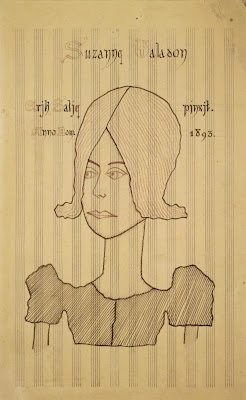 |
| One of two portraits of Suzanne Valadon by Erik Satie ------------------------------- |
This is significant to me personally, since Satie's relationship with Valadon is the inspiration for my play LE CHAT NOIR.
Satie wrote many letters and postcards, one of which got him sued, and images of them can be seen online. There is one currently available for sale for $5,000 and I admit I am tempted to buy it.
But the only online image of the Satie letter from March 11, 1893 is on somebody's Tumblr account. And it's only part of the letter and the image cuts off part of his signature.
The reason that this letter is so special is because it was written during their 6-month long affair, and because it survives. After Satie's death, his friends entered his apartment, and in addition to absolute squalor, found a number of letters (nobody seems to know exactly how many) written to Valadon, but never mailed. Satie's brother took them to Valadon, and she burned them all.
I'm not the only one fascinated by this. In 2013 the BBC ran a program created by British media personality Alistair McGowan called The unsent love letters of Erik Satie.
It's pretty good except for the inevitable inaccuracies, like McGowan claims Valadon was 25 during the affair, but she was 27.
McGowan has also written two dramatic works about Satie, Three Pieces in the Shape of a Pear and more recently Erik Satie's Faction.
A composer, Elena Kats-Chernin, wrote a series of piano pieces called UNSENT LOVE LETTERS
The surviving Satie letter in the original French:
Cher petit BiquiImpossiblede rester sans penser à toutton être ; tu es en moi toute entière ; partoutje ne vois que tes yeuxexquis, tes mains douceset tes petits pieds d’enfant.Toi tu es heureuse ; ce n’est pasma pauvre pensée qui ridera ton front transparent ;non plus que l’ennui de ne point me voir.Pour moi il n’y a que la glacialesolitude qui met du vide dans la têteet de la tristesse plein le cœur.N’oublie pas que ton pauvre amiespère te voir au moins à un de ces trois rendez-vous :1° Ce soir à 9 heures moins le quart de chez moi2° Demain matin encore chez moi3° Demain soir chez Devé (Maison Olivier)
J’ajoute, Biqui chéri, que je ne me mettrainullement en furie si tu ne peux venir à ces rendez-vous ;maintenant je suis devenu terriblement raisonnable ;et malgréle grand bonheur que j’ai à te voirje commence à comprendre que tu ne peux point toujoursfaire ce que tu veux.Tu vois, petit Biqui, qu’il y a commencement à tout.
Je t’embrasse sur le cœur.
Erik Satie
Translation
Dear little BiquiImpossible to stay without thinking of everythingyour being; you are in me completely; everywhereI only see your eyesexquisite, your soft handsand your little child's feet.You are happy; it is not my poor thought that will wrinkle your transparent brow;no more than the boredom of not seeing me.For me there is only the icy loneliness that puts emptiness in the headand sadness fills the heart.
Don't forget that your poor friend hopes to see you on at least one of these three dates:1° Tonight at a quarter to 9 from home2° Tomorrow morning still at my house3° Tomorrow evening at Devé's (Maison Olivier)
I would add, dear Biqui, that I will not get angry at all if you cannot come to these appointments;now I have become terribly reasonable;and despitethe great happiness that I have to see you I begin to understand that you cannot always do what you want. You see, little Biqui, that there is a beginning to everything.
I kiss you on the heart.
Erik Satie
The image I found, online, of this letter, starts in the middle, with "don't forget that your poor friend" - "n'oublie pas que ton pauvre ami..."
The letter is read aloud, lightly edited and almost complete, in my play.

